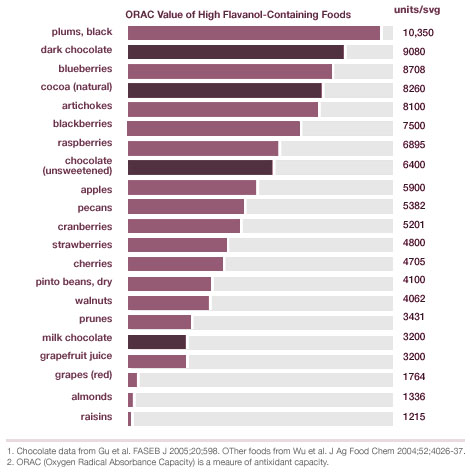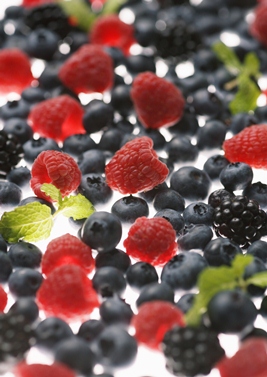
Antioxidants are substances or nutrients in our foods which can prevent or slow the oxidative damage to our body.
When our body cells use oxygen, they naturally produce free radicals (by-products) which can cause damage. Antioxidants act as "free radical scavengers" and hence prevent and repair damage done by these free radicals. Health problems such as heart disease, macular degeneration, diabetes, cancer etc are all contributed by oxidative damage. Indeed, a recent study conducted by researchers from US found that 5 servings of fruits and vegetables reduce the risk of stroke by 25 percent. Antioxidants may also enhance immune defense and therefore lower the risk of cancer and infection.
The process of oxidation in the human body damages cell membranes and other structures including cellular proteins, lipids and DNA. When oxygen is metabolised, it creates ‘free radicals’ which steal electrons from other molecules, causing damage.
The body can cope with some free radicals and needs them to function effectively. However, an overload of free radicals has been linked to certain diseases, including heart disease, liver disease and some cancers. Oxidation can be accelerated by stress, cigarette smoking, alcohol, sunlight, pollution and other factors.
Antioxidants and free radicals
Antioxidants are found in certain foods that neutralise free radicals. These include the nutrient antioxidants, vitamins A, C and E, and the minerals copper, zinc and selenium. Other dietary food compounds, such as the phytochemicals in plants and zoochemicals from animal products, are believed to have greater antioxidant effects than either vitamins or minerals. These are called the non-nutrient antioxidants and include phytochemicals, such as lycopenes in tomatoes, and anthocyanins found in cranberries.
minerals copper, zinc and selenium. Other dietary food compounds, such as the phytochemicals in plants and zoochemicals from animal products, are believed to have greater antioxidant effects than either vitamins or minerals. These are called the non-nutrient antioxidants and include phytochemicals, such as lycopenes in tomatoes, and anthocyanins found in cranberries.
What are free radicals?
Free radicals are formed as part of our natural metabolism but also by environmental factors, including smoking, pesticides, pollution and radiation. Free radicals are unstable molecules which react easily with essential molecules of our body, including DNA, fat and proteins. All organic and inorganic materials consist of atoms, which can be bound together to form molecules. Each atom has a specific number of protons (positively charged) and electrons (negatively charged). Most single atoms are not stable because they have to few or to may electrons. Atoms try to reach a state of maximum stability by giving away or receiving electrons from other atoms, thereby forming molecules. Free radicals are molecules which have one electron too much or too less in order to be stable. Free radicals try to steal or give electrons to other molecules, thereby changing their chemical structure.
When a free radical attacks a molecule, it will then become a free radical itself, causing a chain reaction which can result in the destruction of a cell. Antioxidants have the property to neutralize free radicals without becoming a free radicals themselves. When antioxidants neutralize free radicals by receiving or donating an electron they do not become antioxidants themselves because they are stable in both forms. In other words, antioxidants are chemicals that offer up their own electrons to the free radicals, thus preventing cellular damage. However, when the antioxidant neutralizes a free radical it becomes inactive. Therefore we need to continuously supply our body with antioxidants. The action of free radicals could increase the risk of diseases such as cancer and hearth problems and could accelerate ageing. Antioxidants have the property to neutralize the free radicals and prevent damage. Well known examples of antioxidants are the vitamin C, E and beta-carotene.
The effect of free radicals
Some of the degenerative conditions caused by free radicals include:
Deterioration of the eye lens, which contributes to blindness.
Inflammation of the joints (arthritis).
Damage to nerve cells in the brain, which contributes to conditions such as Parkinson’s or Alzheimer’s disease.
Acceleration of the ageing process.
Increased risk of coronary heart disease, since free radicals encourage low density lipoprotein (LDL) cholesterol to adhere to artery walls.
Certain cancers, triggered by damaged cell DNA.
The disease-fighting antioxidants
A diet high in antioxidants may reduce the risk of many diseases, including heart disease and certain cancers. Antioxidants scavenge the free radicals from the body cells, and prevent or reduce the damage caused by oxidation.
The protective effect of antioxidants continues to be studied around the world. For instance, men who eat plenty of the antioxidant lycopene (found in tomatoes) may be less likely than other men to develop prostate cancer. Lutein, found in spinach and corn, has been linked to a lower incidence of eye lens degeneration and associated blindness in the elderly. Flavonoids, such as the tea catechins found in green tea, are believed to contribute to the low rates of heart disease in Japan.
Sources of antioxidants
Good sources of antioxidants include:
Allium sulphur compounds - leeks, onions and garlic.
Anthocyanins - eggplant, grapes and berries.
Beta-carotene - pumpkin, mangoes, apricots, carrots, spinach and parsley.
Catechins - red wine and tea.
Copper - seafood, lean meat, milk and nuts.
Cryptoxanthins - red capsicum, pumpkin and mangoes.
Flavonoids - tea, green tea, citrus fruits, red wine, onion and apples.
Indoles - cruciferous vegetables such as broccoli, cabbage and cauliflower.
Isoflavonoids - soybeans, tofu, lentils, peas and milk.
Lignans - sesame seeds, bran, whole grains and vegetables.
Lutein - leafy greens like spinach, and corn.
Lycopene - tomatoes, pink grapefruit and watermelon.
Manganese - seafood, lean meat, milk and nuts.
Polyphenols - thyme and oregano.
Selenium - seafood, offal, lean meat and whole grains.
Vitamin C - oranges, blackcurrants, kiwi fruit, mangoes, broccoli, spinach, capsicum and strawberries.
Vitamin E - vegetable oils (such as wheatgerm oil), avocados, nuts, seeds and whole grains.
Zinc - seafood, lean meat, milk and nuts.
Zoochemicals - red meat, offal and fish. Also derived from the plants animals eat.
Vitamin supplements
 Some studies suggest that antioxidants are less effective when isolated from food and presented in tablet form. For instance, vitamin A (beta-carotene) has been associated with a reduced risk of certain cancers but an increase in others, such as lung cancer in smokers, if vitamin A is purified from foodstuffs.
Some studies suggest that antioxidants are less effective when isolated from food and presented in tablet form. For instance, vitamin A (beta-carotene) has been associated with a reduced risk of certain cancers but an increase in others, such as lung cancer in smokers, if vitamin A is purified from foodstuffs.
A study examining the effects of vitamin E found that it didn’t offer the same benefits when taken as a supplement. Also, antioxidant minerals or vitamins can act as pro-oxidants or damaging ‘oxidants’ if they are consumed at levels significantly above the recommended amounts for dietary intake.
A well-balanced diet, which includes consuming antioxidants from whole foods, is best. If you insist on taking a supplement, seek supplements that contain all nutrients at the recommended levels.
General recommendations
Research is divided over whether or not antioxidant supplements offer the same health benefits as antioxidants in foods. It is recommended that people eat a wide variety of fresh fruits, vegetables, whole grains, lean meats and dairy products every day. The diet should include five daily serves of fruit and vegetables. One serve is a medium-sized piece of fruit or a half-cup of cooked vegetables. See your doctor or dietitian for advice.
The process of oxidation in the human body produces chemicals called free radicals, which damage cell membranes and other structures.
Free radicals have been linked to a variety of diseases, including heart disease and certain cancers.
Disclaimer: This website is for information purposes only. By providing the information contained herein we are not diagnosing, treating, curing, mitigating, or preventing any type of disease or medical condition. Before beginning any type of natural, integrative or conventional treatment regime, it is advisible to seek the advice of a licensed healthcare professional.























